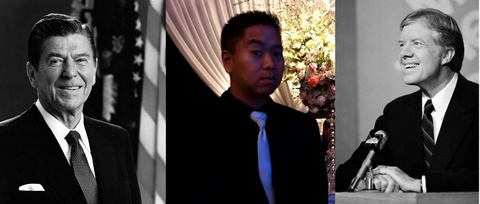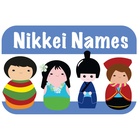My birth certificate says Jimmy Seiji. When they hear my name, many of my friends have asked me, “Is your real name Jimmy or James?” And I tell them that my name is Jimmy; that’s how it appears on my birth certificate.
When I asked my parents about the reason for my name, they told me that when I was born they had no time to think of a name (since all they cared about was that their only male child was born healthy). After my birth—since they hadn’t thought of a name—the best idea they could come up with was to ask my godparents for a name. According to them, [my godparents] suggested Jimmy because of Jimmy Carter, the U.S. president at that time.
The funny thing is that if that was the reason, I should have been called Ronald, since I was born in 1986, when Ronald Reagan held the presidency. (Although I’m not sure whether Ronald Amemiya would have pleased either my parents or myself.)
Having satisfied my curiosity about my first name, I set my sights on my middle name: Seiji.
Where does this name come from? My ojiichan and obaachan chose this name for me when I was born. While I can’t recall the physical appearance of my ojiichan, I feel a profound fondness for the name (which I hardly ever use nowadays) because my parents told me that when I was born, my ojiichan was already at an advanced age and that that was the last time he left the house before falling ill and dying.
Some years ago, I wanted to discover the meaning of my Japanese name, so I looked it up in a dictionary (because I know almost no nihongo). My first reaction was confusion, as I hadn’t expected the translation of my name (though it could be another kanji) to be that of a person connected with politics or the government. The strangest thing of all is that because of the way I’ve been raised, the places where I’ve studied, and the manner I prefer to work, I am a person who doesn’t like politics at all. I prefer to be quite pragmatic and direct when dealing with people.
Perhaps the reason my grandparents chose this name was its connection to my Western name (since [my godparents] had chosen the name of a ruler). And if anyone believes that names mold our personalities, then it could be that the translation of Seiji is closer in meaning to “someone connected with leadership roles.” That’s one of the things I’ve been actively performing since I entered college, even though I still hate national politics.
* * * * *
Our Editorial Committee selected this article as one of their favorite Nikkei Names stories. Here are their comments.
Comment from Javier Garcia
When it comes to the first text, “My experience as a Dekasegi” by Santos Ikeda Yoshikawa, the author has depicted the experience of identification (which is not the same as identity) as leading to conflicts within the Nikkei, especially the emotional and social hardships they must face. Yet, I feel more inclined toward the text by Jimmy Seiji because I think it better fits the purpose of this project, as it presents the choice of a name as a cultural factor, in addition to the reasons and chance happenings that can define an identity, including the family background. And especially, for its evocation of the author’s ancestors and roots, while highlighting a custom that remains relevant despite the passage of time and the habits of generations.
Comment from Alberto Matsumoto
When our parents choose a Japanese name, they always look in the kanji for ideograms that have specific meanings, with much hope for the future while inspired by their ancestors, some event, or important character in history. Unquestionably, the name “Seiji” contains certain kanji characters that reflect the wishes of the grandparents. There were countries like Argentina and others, where by law one could not choose foreign first names, only family names. For that reason, even though some have felt a little embarrassment since childhood, it’s very important to have a Japanese name chosen by our grandparents or parents, and that has been registered in official birth certificates.
In the article, the author remembers that story and although he still doesn’t know for sure his name’s kanji characters, this mystery is what has encouraged him to recall his ancestors and his roots. Even if he is never elected president, as long as he honors the good name of his family, that’s more than enough. For they will be proud of the author.
© 2014 Jimmy Seiji Amemiya Siu




